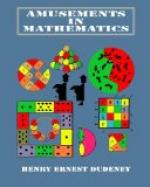109.—THE GREAT SCRAMBLE.
After dinner, the five boys of a household happened to find a parcel of sugar-plums. It was quite unexpected loot, and an exciting scramble ensued, the full details of which I will recount with accuracy, as it forms an interesting puzzle.
You see, Andrew managed to get possession of just two-thirds of the parcel of sugar-plums. Bob at once grabbed three-eighths of these, and Charlie managed to seize three-tenths also. Then young David dashed upon the scene, and captured all that Andrew had left, except one-seventh, which Edgar artfully secured for himself by a cunning trick. Now the fun began in real earnest, for Andrew and Charlie jointly set upon Bob, who stumbled against the fender and dropped half of all that he had, which were equally picked up by David and Edgar, who had crawled under a table and were waiting. Next, Bob sprang on Charlie from a chair, and upset all the latter’s collection on to the floor. Of this prize Andrew got just a quarter, Bob gathered up one-third, David got two-sevenths, while Charlie and Edgar divided equally what was left of that stock.
[Illustration]
They were just thinking the fray was over when David suddenly struck out in two directions at once, upsetting three-quarters of what Bob and Andrew had last acquired. The two latter, with the greatest difficulty, recovered five-eighths of it in equal shares, but the three others each carried off one-fifth of the same. Every sugar-plum was now accounted for, and they called a truce, and divided equally amongst them the remainder of the parcel. What is the smallest number of sugar-plums there could have been at the start, and what proportion did each boy obtain?
110.—THE ABBOT’S PUZZLE.
The first English puzzlist whose name has come down to us was a Yorkshireman—no other than Alcuin, Abbot of Canterbury (A.D. 735-804). Here is a little puzzle from his works, which is at least interesting on account of its antiquity. “If 100 bushels of corn were distributed among 100 people in such a manner that each man received three bushels, each woman two, and each child half a bushel, how many men, women, and children were there?”
Now, there are six different correct answers, if we exclude a case where there would be no women. But let us say that there were just five times as many women as men, then what is the correct solution?
111.—REAPING THE CORN.
A farmer had a square cornfield. The corn was all ripe for reaping, and, as he was short of men, it was arranged that he and his son should share the work between them. The farmer first cut one rod wide all round the square, thus leaving a smaller square of standing corn in the middle of the field. “Now,” he said to his son, “I have cut my half of the field, and you can do your share.” The son was not quite satisfied as to the proposed division of labour, and as the village schoolmaster happened to be passing, he appealed to that person to decide the matter. He found the farmer was quite correct, provided there was no dispute as to the size of the field, and on this point they were agreed. Can you tell the area of the field, as that ingenious schoolmaster succeeded in doing?




